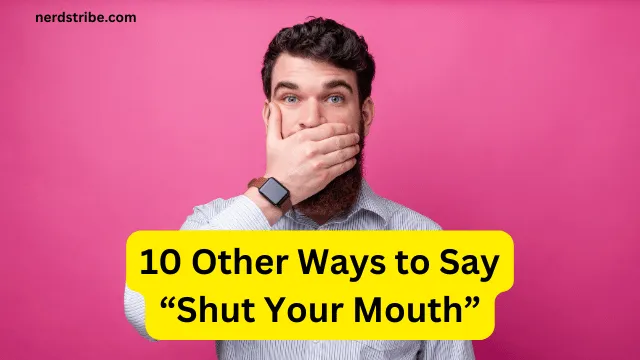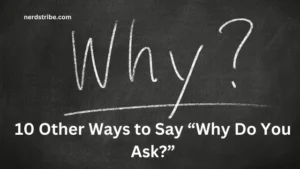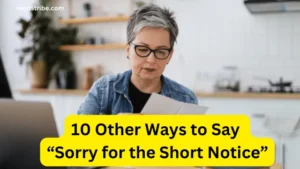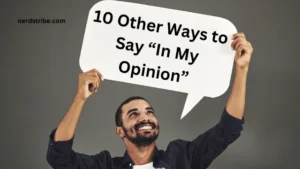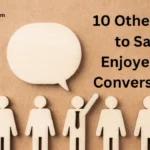Communication is an art, and words carry immense power. Sometimes, we need to ask someone to stop talking, but the phrase “Shut your mouth” can come across as harsh or impolite. The way we phrase things matters, especially if we want to maintain relationships and show respect, even in tense moments.
Whether you’re in a casual conversation, a professional setting, or a heated debate, finding alternative ways to express this sentiment can make a world of difference. It’s not just about softening the blow; it’s about being tactful, considerate, and sometimes even humorous. The right words can help de-escalate a situation instead of inflaming it further.
In this blog, we’ll explore 10 creative and polite alternatives to “Shut your mouth” that you can use in different contexts. These phrases will help you communicate your intentions effectively while maintaining respect and understanding.

Contents
- 1 1. Let’s Keep It Down
- 2 2. Can We Pause for a Moment?
- 3 3. Hold That Thought
- 4 4. Let’s Save That for Later
- 5 5. Please Allow Me to Finish
- 6 6. Let’s Keep the Focus Here
- 7 7. Let’s Take a Breather
- 8 8. Can We Keep It Brief?
- 9 9. Let’s Stay on Track
- 10 10. I Need a Moment of Silence
- 11 Conclusion
- 12 FAQs
- 12.1 Why should I avoid saying “Shut your mouth”?
- 12.2 What’s the best phrase for professional settings?
- 12.3 Are these alternatives suitable for casual conversations?
- 12.4 How can I de-escalate tense conversations with these phrases?
- 12.5 Can humor be used in these situations?
- 12.6 What if someone doesn’t respond well to these phrases?
1. Let’s Keep It Down
A polite way to request silence without sounding confrontational.
- Key Meaning: Asks for quiet in a gentle and non-aggressive manner.
- Usage: Perfect for group settings or noisy environments.
- Example: “Hey everyone, let’s keep it down so we can focus.”
- Why It’s Effective: It doesn’t single anyone out and feels collaborative.
2. Can We Pause for a Moment?
A respectful way to interrupt someone or halt a conversation.
- Key Meaning: Suggests taking a break to regroup or refocus.
- Usage: Great for meetings or discussions that need structure.
- Example: “Can we pause for a moment? I’d like to address something.”
- Why It’s Effective: It implies thoughtfulness and professionalism.
3. Hold That Thought
A conversational way to ask someone to stop talking temporarily.
- Key Meaning: Politely interrupts while valuing the other person’s input.
- Usage: Ideal for casual or professional conversations.
- Example: “Hold that thought—let’s circle back to it later.”
- Why It’s Effective: It acknowledges the speaker while redirecting the discussion.
4. Let’s Save That for Later
A softer alternative to silence someone without dismissing their ideas.
- Key Meaning: Suggests deferring the conversation for another time.
- Usage: Useful in meetings or during lengthy discussions.
- Example: “Let’s save that for later so we can stay on track.”
- Why It’s Effective: It’s considerate and keeps the conversation organized.
5. Please Allow Me to Finish
A direct yet polite way to request uninterrupted speaking time.
- Key Meaning: Sets boundaries while showing respect.
- Usage: Effective in debates, meetings, or arguments.
- Example: “Please allow me to finish my point before we move on.”
- Why It’s Effective: It asserts control without being offensive.

6. Let’s Keep the Focus Here
Encourages others to stay on topic and avoid unnecessary interruptions.
- Key Meaning: Redirects attention back to the primary discussion.
- Usage: Works well in team discussions or brainstorming sessions.
- Example: “Let’s keep the focus here so we don’t lose track.”
- Why It’s Effective: It feels constructive and keeps everyone aligned.
7. Let’s Take a Breather
Suggests a break to calm things down and reflect.
- Key Meaning: Encourages a pause in speaking to reset the tone.
- Usage: Helpful in heated or emotional conversations.
- Example: “Let’s take a breather and revisit this in a few minutes.”
- Why It’s Effective: It diffuses tension and promotes a calm environment.
8. Can We Keep It Brief?
A subtle way to ask someone to stop talking excessively.
- Key Meaning: Requests concise communication without offending.
- Usage: Suitable for time-sensitive or fast-paced situations.
- Example: “Can we keep it brief? We’re running short on time.”
- Why It’s Effective: It emphasizes efficiency without being rude.
9. Let’s Stay on Track
Encourages sticking to the agenda and avoiding distractions.
- Key Meaning: Gently steers the conversation back to its purpose.
- Usage: Ideal for meetings or task-focused discussions.
- Example: “Let’s stay on track and revisit other points later.”
- Why It’s Effective: It feels purposeful and minimizes disruptions.
10. I Need a Moment of Silence
A clear and respectful request for quiet.
- Key Meaning: Asks for silence in a straightforward manner.
- Usage: Useful in moments of frustration or when focus is needed.
- Example: “I need a moment of silence to gather my thoughts.”
- Why It’s Effective: It’s honest and sets clear expectations.
Conclusion
Words are powerful tools that shape our interactions with others. When you need to ask someone to stop talking, choosing the right phrase can maintain respect and foster better communication.
The alternatives listed above offer a range of options, from polite redirections to professional requests, ensuring you can navigate any conversation gracefully. By using these alternatives, you can express yourself tactfully and build stronger connections with those around you.
Whether it’s a casual chat or a formal discussion, these phrases allow you to set boundaries without escalating tension. Communication is about clarity, respect, and empathy—and these alternatives help you achieve all three.
FAQs
Why should I avoid saying “Shut your mouth”?
It can come across as rude or aggressive, potentially damaging relationships.
What’s the best phrase for professional settings?
“Can we pause for a moment?” or “Let’s stay on track” works well in formal environments.
Are these alternatives suitable for casual conversations?
Yes, phrases like “Hold that thought” or “Let’s take a breather” are perfect for informal contexts.
How can I de-escalate tense conversations with these phrases?
Use calming alternatives like “Let’s take a breather” or “I need a moment of silence.”
Can humor be used in these situations?
Absolutely! Humor can lighten the mood, but ensure it’s appropriate for the context.
What if someone doesn’t respond well to these phrases?
Stay calm, clarify your intention, and use empathetic language to address their concerns.

